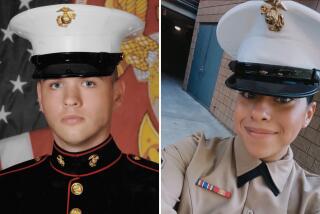Kindness at Indio Belied Reputation : Patton Got a Bad Press, Neighbor Says
- Share via
INDIO — Gen. George S. Patton waged losing personal battles with politicians, the government and press, but he deserved a better reputation away from the combat zone, says a man who lived next door to him in 1942.
Joseph Chiriaco lived in a community called Shavers Summit when the Army arrived in the early 1940s and turned the desert into a huge training area that stretched from Pomona to Phoenix and from Yuma, Ariz., to Boulder City, Nev. There were 10 camps comprising what the Army called the California-Arizona Maneuver Area.
When he arrived in 1942, Patton set up his headquarters at Camp Young, two miles from Chiriaco’s property line, just off what is now Interstate 10 about 30 miles east of Indio, said the 80-year-old Chiriaco.
Training for Africa
The general put 250,000 men in the 1st Armored Corps through rigorous training in preparation for the invasion of North Africa.
Chiriaco, who owned a restaurant and store, worried about his Italian ancestry because he knew the United States was fighting the Italians.
He told Patton he would leave the area, he said. But Patton refused his offer. “He told me, ‘You stay here and run this place and I’ll run the Army.’ ”
Before Patton left for Morocco, he fixed it so Chiriaco’s store and restaurant was part of the Desert Training Center. That made it possible for soldiers to buy beer and food at the store, Chiriaco explained. Patton also changed the name Shaver’s Summit to Chiriaco Summit, he said.
Civilian Rights Protected
“He did a lot of things out here you wouldn’t expect,” Chiriaco said. He recalled the extra care Patton took to ensure that soldiers did not disturb the few civilians living in the area.
“He was really protecting the civil rights of people,” Chiriaco said. “He was a pretty good man, I thought.”
Chiriaco believes much of Patton’s reputation as a disciplinarian was undeserved. “Nobody was fair to him. Not the politicians or the government or the press.”
Historians describe Patton as one of the most colorful American generals of World War II. His outspoken views, dramatic manner and often reckless behavior earned him the nickname “Old Blood and Guts.”
Chiriaco views Patton’s death in a car crash in December of 1945 as particularly sad. “He would have been tickled to death to die on the battlefield,” Chiriaco said. “To die in a traffic accident would be the last thing he wanted to do.”
More to Read
Get the L.A. Times Politics newsletter
Deeply reported insights into legislation, politics and policy from Sacramento, Washington and beyond. In your inbox twice per week.
You may occasionally receive promotional content from the Los Angeles Times.









